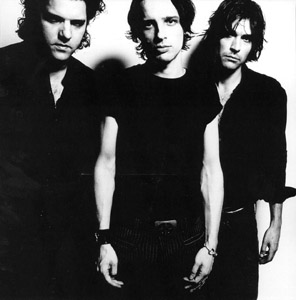![[Metroactive Music]](/music/gifs/music468.gif)
[ Music Index | Santa Cruz Week | SantaCruz Home | Archives ]
Dial M for Monster
Jon Spencer faces the beast within on the Blues Explosion's 'Plastic Fang'
By Steve Palopoli
JON SPENCER is all about monsters these days. There's a picture of a big ol' scary one on the cover of the Jon Spencer Blues Explosion's new album, Plastic Fang, and his latest songs read like the Elvira Top 40--"Killer Wolf," "The Midnight Creep," "Down in the Beast"--with lyrics to match. Hell, one of the new songs manages to squeeze snarling werewolves, blood-smeared mouths, curses, silver bullets and a mob of villagers into four minutes of creeping, lurching guitar rock.
Which is cool, since mountains of circumstantial evidence--mostly comprised, admittedly, of videotaped Joseph Campbell specials and old episodes of In Search Of--would seem to point to the conclusion that when it comes to symbolism, monsters are the shit. Certainly most of us remember wanting to be a Dracula or a Frankenstein when we were kids, or perhaps spending hours outlining a complex Monster Escape Plan should a Dracula or Frankenstein invasion scenario present itself.
So as I'm thinking about all this while talking to Jon Spencer, I can't help wondering: which monster is this guy?
Fans of his equally adored and reviled early noise-rock band Pussy Galore--famous for releases like Dial M for Motherfucker and Groovy Hate Fuck and songs like "Pig Sweat," "Don't Give a Fuck About You" and "Kill Yourself" on which Spencer growls almost unintelligibly about doing bad things to bad people--know him as a kind of sociopathic, psychosexual deviant. The straight-ahead, thick-riffed Plastic Fang, which is light years beyond the rockin' but all-over-the-place sound of Pussy Galore and even most of the Blues Explosion's early records, definitely nails the werewolf vibe.
Rock on the Rampage
But I'd have to say that ultimately Spencer seems most like Jekyll and Hyde. Whereas his musical persona is this crazed, rampaging maniac, he is in fact the most polite, proper and almost soft-spoken guy you could ever hope to meet when he's not drinking the rock & roll potion.
And he clearly digs the new record's monster mash.
"It was certainly fun for me as someone who'd always been fascinated with monsters and horror ever since I was a little kid," says Spencer. "It was just something that happened in its own way, and I eventually became aware of it. We began writing this record in the fall of 2000, and around Halloween, when they show a lot of those films on TV, it hit me what was going on."
Interestingly enough, the classic monster themes did have a deeper meaning for Spencer, who went through some troubling times in his personal life, and the resonance comes through on the record with repeated listenings.
"It was a way for me to write about some very difficult feelings and hardship in my life," he says. "It was easier for me to do it by employing that kind of imagery and those kind of characters."
The sound of the record really fits, too. Spencer has always had to deal with more than his share of Rolling Stones comparisons--and with Plastic Fang he's getting them more than anytime since Pussy Galore (who, partly as a tribute, partly as a sick joke, did in fact release a cassette on which they covered Exile on Main Street). But this record reaches back even further to the earliest garage rock, the swampy post-rockabilly sound of the early '60s that gave the world some of the rawest rock ever recorded in songs like the Groupies' "Primitive," the Phantom's "Love Me," and, appropriately, the Frantics' "Werewolf." Another classic from that overlooked era is Hasil Adkins' "She Said," and wouldn't you know it, one of Plastic Fang's werewolf songs bears the same name.
"Of course, that's a great connection," says Spencer, who confirms the throwback sound was indeed an influence on what he considers "a kind of old-fashioned record." "Sixties garage punk is definitely the first rock & roll I got into, and kind of what I cut my teeth on, so it's probably way at the core of me. That was probably a huge influence."
The result, strangely enough, is the JSBX's most accessible record, though that's a bit of a surprise to Spencer himself.
"My perception of it is a little warped. I was thinking it was kind of a heavy album, but I think to the casual listener it's not such a heavy trip," he says. "It's very listenable--while we were working on this, [producer] Steve Jordan would always say, 'I want someone to be able to just listen to this over and over again.' And I think he did it."
He's also pleased to see that the rock critics who often find his records too abstract or obtuse have been turning on to Plastic Fang, or at least giving it a fair listen. But when he talks about the preconceptions and prejudices that have dogged the band, his voice drops into that recognizable booming baritone, and a flash of the musical monster finally rises out of the calm Jekyll Spencer.
"There do seem to be some people out there who have a chip on their shoulder against the Blues Explosion," he says. "But they're a bunch of uptight motherfuckers."
Copyright © Metro Publishing Inc. Maintained by Boulevards New Media.
Buy Jon Spencer Blues Explosion at CDNOW!
![]()

Spencer: For Horror: The Blues Explosion goes bump in the night on 'Plastic Fang.'
The Jon Spencer Blues Explosion plays the Catalyst Thursday, Sept. 19. The Liars and Yeah Yeah Yeah open at 9pm. Tickets are $13/advance, $15/door for the 16 and over show.
From the September 18-25, 2002 issue of Metro Santa Cruz.